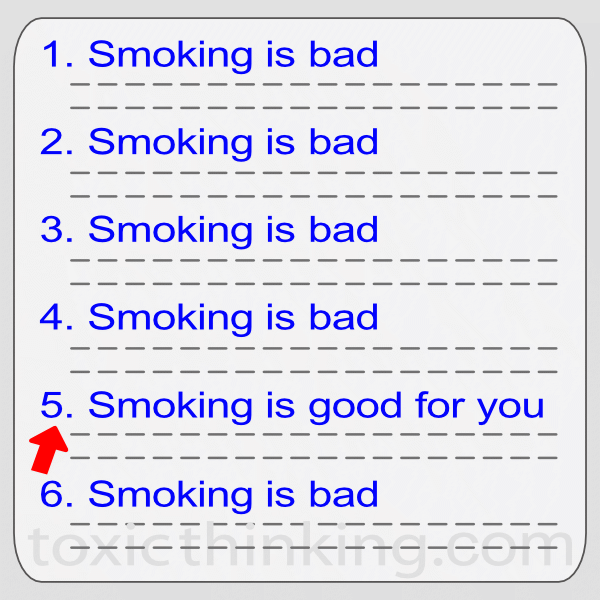In one’s day-to-day life, one’s mind gathers a lot of information that helps one to form opinions about various topics. Unfortunately, when one tries to gather new information about a topic, one’s mind may only look at information that supports one’s current opinion about that topic, while ignoring information that might make one change one’s opinion. This could make one have incorrect opinions as these are based on incomplete information. Psychologists have named this way of thinking, where one’s mind ignores information that doesn’t agree with its current opinions, as “confirmation bias”.
Here is a short example of how confirmation bias can be harmful.
Sarah has the opinion that cigarette smoking is not harmful to one’s health. A friend tells her that she is wrong, so Sarah decides to check things by doing a search on the internet about the health risks of smoking. The first four web search results have topics that suggest that cigarette smoking causes lung cancer. The fifth search result, however, seems to suggest that cigarette smoking is harmless and that the dangers of smoking are a conspiracy theory. Sarah’s ignored the first four results, as they do not agree with her current opinion that cigarette smoking is healthy. Instead, she only clicks the fifth result, as this agrees with her current opinion. This leads her to wrongly think that cigarette smoking is healthy.

As the above example shows, confirmation bias can make one see the world in a very distorted way, falsely giving an impression that one’s current opinions are the only correct ones.
What makes confirmation bias very dangerous in modern times is that social media companies often try to show you only information that they think you like to see and hide information that they think does not interest you. Essentially, they do the confirmation bias thinking for you, as they make you only see information that agrees with your current opinions. This can make you have narrow and possibly incorrect opinions, as they are based on selective information. Such practices can be particularly important when it comes to information related to political parties (e.g. during elections), as in this situation, confirmation bias can lead to people having extreme political opinions that are unchallenged by reality.
To minimise the chances of your mind doing confirmation bias thinking, try and overcome its reluctance to look at information that does not agree with your current opinions. Try, once in a while, to actively look at or listen to media that are known to have opinions that differ from your own opinions. This will help you to have meaningful opinions that are based on a wide range of information.